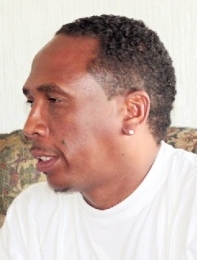Local man wants governor to grant him pardon for crime
By Nick Hiltunen
Published in News on June 24, 2010 1:46 PM

Thomas Parker speaks about his ordeal since being wrongly convicted of a robbery charge.
Thomas E. Parker doesn't have an immaculate criminal record.
But there is one crime he didn't do, he maintains -- rob the now-defunct Merritt Supermarket on Royall Avenue in January 1999.
A federal judge, Terrence W. Boyle, agreed in an order issued in December 2002, and Parker was released from an active prison term after a period of waiting to see whether he would be granted a new trial.
Despite new evidence proving his innocence, Parker still has not gotten a pardon from the governor -- former Gov. Mike Easley denied his request.
Now, through his attorney, Parker will seek a pardon from Gov. Bev Perdue.
Parker's attorney, Bryson Aldridge of Durham, said the pardon request will be sent to the governor within a month.
Parker says he was in Alabama at the time of the alleged crime, which occurred on Jan. 2, 1999, and said he has the witnesses to prove it.
A local attorney representing Parker played a role in failing to bring those witnesses to trial, Boyle ruled.
The U.S. District Court Judge found that Parker was the victim of "ineffective assistance of counsel," after being represented by local attorney Charles Gurley.
Gurley did not respond to requests for comment.
In his ruling, Boyle said determining ineffectiveness of an attorney is difficult.
"A reviewing court 'does not grade' the lawyer's trial performance, it only examines whether his conduct was reasonable under prevailing professional norms and in light of the circumstances," Boyle wrote in the decision.
However, Boyle said it was clear that Gurley did not contact the people he was asked to contact in defending Parker.
"The court finds counsel's statements that he was unaware of these witnesses or unable to obtain their statements to be neither compelling nor accurate," the U.S. District Court judge wrote in his decision.
Boyle also found that Gurley had only contacted two witnesses out of many who could have provided exculpatory evidence to show Parker's innocence.
One other witness was contacted the night before the case went to trial, the judge found.
Other factors added up to the judge's decision, including a McDonald's restaurant application that Parker filled out in December 1998, and a paycheck stub signed Jan. 5, 1999, which would have placed Parker at work in Alabama when the robbery was committed. Neither of those items was introduced into evidence.
Parker said he tried his best to convince police of his innocence.
He is far shorter than the person described in the robbery of Merritt Supermarket by the victims, Kenneth Head, who is now deceased, and Anthony Russo.
He also has a prominent mole in his face, which Parker says is hard to miss.
"(The victims) never mentioned I had a mole or (any) of that," he said.
The police report from the January 1999 robbery said the thief came into the store earlier in the night and bought a pack of chewing gum, then left the store.
The witnesses told police that the thief later entered the store again and tried to purchase an iced tea.
"When the offender put the drink on the counter ... (a victim) said the offender struck him in the head with the gun and demanded all the money," according to the original police report, provided to the newspaper by Parker.
Perhaps the most compelling evidence was produced from that iced tea bottle -- a State Bureau of Investigation analysis of the drink container found prints that did not match Parker's.
Assistant District Attorney Terry Yeh, then Terry Light, said police had already looked for fingerprints and came up empty.
"Light's (Yeh's) understanding was that the iced tea bottle had been dusted prior to trial and that no fingerprints were found. She further stated that the petitioner's criminal history was 'horrible' and that ... Gurley 'zealously defended his client.'"
All of those factors added up to the offer of a new trial for the defendant, or his immediate release if a new trial was not offered within 90 days.
"The court concludes that, had the jury been presented with all of the evidence supporting the petitioner (Parker's) alibi defense, the state's eyewitness testimony would not have been compelling and the jury would have had a reasonable doubt as to (Parker's) guilt."
Despite the judge's decision that Parker was innocent, the conviction has still plagued him -- he still has trouble getting jobs when potential employers find the charge.
"I'm not saying that I've been no saint in my life, but I didn't do that. I ain't never had no robbery charge," Parker said.
Potential employers seem particularly reticent to hire someone with a past robbery charge -- even though they can see the charge was eventually vacated, he said.
"I started going to cosmetology school, and trying to get jobs, and everybody wanted a background check, and it wasn't working out. They see that the case was vacated, but they still looked at it as a robbery charge, and nobody would hire me."
Thelma Allen, a close friend of Parker's family, said she understands where the employers are coming from, but believes especially in Parker's case, a second chance is warranted.
"I feel kind of bad, because he is trying. He's going out looking (for) jobs, and every time he gets one -- he had one at the mall -- and they let him go. Things just ain't working out for him, because he's got his record in his head. Everybody needs a chance in life -- criminals, too. They all need a chance," Mrs. Allen said.
